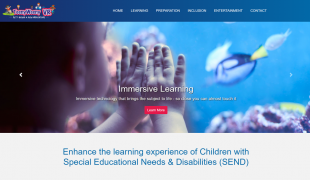- 3357
- 306
- 17
- 13
- 0
- Help Ukraine
About the solution
Vedant Tapiavala and Rithvik Ganesh were just two high school students from Texas when they designed an app to help patients with Alzheimer’s disease, a form of dementia. The study "Estimation of the global prevalence of dementia in 2019 and forecasted prevalence in 2050: an analysis for the Global Burden of Disease Study 2019" estimates that 57 million people were living with dementia worldwide in 2019, and that number is expected to rise to an astounding 153 million by 2050. Therefore, it is imperative to implement risk reduction policies and improve existing therapeutics, while also upgrading the available palliative care. The last one was the path the two inventive students decided to follow.
After a volunteering experience at a memory care nursing center in their hometown, they gained inspiration to design the app AlzBuddy. This interactive memory care assistant resorts to melodies, pictures, and playful games to help reignite memories of people living with early-stage dementia and Alzheimer's.
The sounds module of the AlzBuddy app contains over 200 sounds - songs, commercials, speeches, animal sounds, and more - embedded directly within the application. The pictures tab has a selection of over 100 pictures with descriptions, which help the user remember and reminisce about key figures and items throughout their lives. The game module includes a color grid game suggested by a medical professional to engage and challenge the user, a picture association game suggested by a nursing home, and a memory game.
AlzBuddy is a free app available for both iOS and Android.
This story was adapted from: https://www.alzint.org/news-events/news/new-data-predicts-the-number-of-... and https://www.nbcdfw.com/news/local/north-texas-high-school-students-desig...
The images were taken from: https://augustemobile.wixsite.com/alzbuddy and
This solution shall not include mention to the use of drugs, chemicals or biologicals (including food); invasive devices; offensive, commercial or inherently dangerous content. This solution was not medically validated. Proceed with caution! If you have any doubts, please consult with a health professional.
DISCLAIMER: This story was written by someone who is not the author of the solution, therefore please be advised that, although it was written with the utmost respect for the innovation and the innovator, there can be some incorrect statements. If you find any errors please contact the patient Innovation team via info@patient-innovation.com
-
-
371
-
0
-
4745

Memory Lane Games - Reigniting memories for those with Dementia & Alzheimer's
CAREGIVING
COMMUNICATION: Communicating, whether by speaking, listening, or other means
Alzheimer's Disease
App (Including when connected with wearable)
Videogame
Memory loss
Recovering cognitive function
Promoting self-management
Managing Neurological Disorders
Building Supportive Community Relationships
Promoting inclusivity and social integration
Enhancing Mental Health
Improving Speech and Communication
To improve Treatment/Therapy
Preventing (Vaccination, Protection, Falls, Research/Mapping)
Raise awareness
Caregiving Support
General and Family Medicine
Neurology
United Kingdom
-
-
-
539
-
0
-
8772

Student invents "epilepsy alarm" for his grandmother
CAREGIVING
COMMUNICATION: Communicating, whether by speaking, listening, or other means
Epilepsy
App (Including when connected with wearable)
Muscle cramps or spasms
Stiffness or rigidity (difficulty moving)
Loss of balance
Sleep disturbances
Anxiety
Twitching or involuntary movements (myoclonus)
Seizures
Managing Neurological Disorders
Enhancing Mental Health
To improve Treatment/Therapy
Preventing (Vaccination, Protection, Falls, Research/Mapping)
Caregiving Support
General and Family Medicine
Neurology
Psychiatry
Public Health
China
-
-
-
436
-
0
-
4856

Teeny Weeny VR- a new way of terapy for autistic children.
CAREGIVING
COMMUNICATION: Communicating, whether by speaking, listening, or other means
Autism
AI algorithm
Anxiety
Difficulty concentrating or making decisions
Social withdrawal or isolation
Promoting self-management
Managing Neurological Disorders
Building Supportive Community Relationships
Promoting inclusivity and social integration
Improving Speech and Communication
To improve Treatment/Therapy
Preventing (Vaccination, Protection, Falls, Research/Mapping)
Raise awareness
Caregiving Support
Child and Adolescent Psychiatry
General and Family Medicine
Neurology
Pediatrics
Psychiatry
United Kingdom
-
 en
en